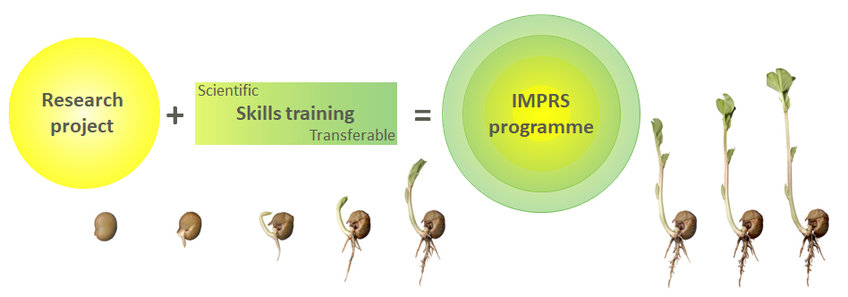
Doctoral Training
Our IMPRS is an interdisciplinary doctoral programme devoted to scientific excellence in plant biology, with a focus on understanding the fundamental processes of how plants grow, reproduce and interact with the abiotic and biotic environment. Research is at the core of the doctoral programme.
The IMPRS MolPlant provides intellectual and technical training through original research, interdisciplinary dialogue, and training of transferable skills.
Our doctoral candidates are highly skilled young researchers.
The research projects of our doctoral researchers are carried out in our faculty members' research groups, under the direct supervision of our faculty members and senior scientists in their groups.
In addition, each doctoral researcher is supported by an independent PhD advisory committee (PAC). The PhD advisory committee is designed to give guidance to the student and evaluate the progress of the research project. The PAC comprises 2-3 members and is tailored to the needs of the student and the thesis project. At least one committee member has to be from another department than the doctoral researcher. The PAC may include external members whose scientific expertise fits with the doctoral project and who are situated at other institutions than those participating in the IMPRS MolPlant.
IMPRS MolPlant doctoral researchers hold yearly meetings with their PAC, so-called “PAC meetings”, to discuss the progress of their research, identify possible problems as soon as possible, and adjust the work plan if needed. The supervisor joins these meetings. A part of the yearly PAC meeting is held in the absence of the supervisor, to address personal problems or situations of conflict if needed.
The elements of our curriculum and doctoral training have three major aims:
- Support of doctoral candidates and their scientific projects
- Promotion of interdisciplinary dialogue
- Development of transferable skills
The doctoral candidates within the IMPRS MolPlant come from a variety of scientific backgrounds - biology, biochemistry, chemistry, bioinformatics, physics and mathematics. Their research projects have an experimental or theoretical/bioinformatics focus or combine both approaches. We aim to be as flexible as possible in our scientific and complementary training so that the curricular activities fit the individual needs of each doctoral researcher and their thesis project.
Junior researchers who work on one side of the spectrum - experimental or theoretical - come into contact with the other side of the spectrum during the various weekly seminars at different levels in the MPI-MP and, more directly, the monthly PhD seminar where doctoral researchers present and discuss their research projects with their peers. In addition, the IMPRS PhD retreat provides a valuable opportunity for our junior researchers to exchange knowledge and experience and to discuss new research ideas in an informal setting.
You can find an overview of the path through a doctorate in the IMPRS MolPlant at PhD “Life Cycle”.
Good Scientific Practice
A key value of research is scientific integrity and compliance with the standards of good scientific practice. All doctoral researchers should be familiar with the Max Planck Society’s Rules of Good Scientific Practice .
Further information and guidelines on responsible conduct of research, are given on the Research Integrity Portal of the German Research Foundation, DFG.
The Max Planck Society’s LeitPLANCKen provide guidelines and internal regulations for responsible and compliant behaviour within the organization and their institutes that address values and issues beyond scientific integrity. The LeitPLANCKen address all employees - scientists, support staff and administrative staff.